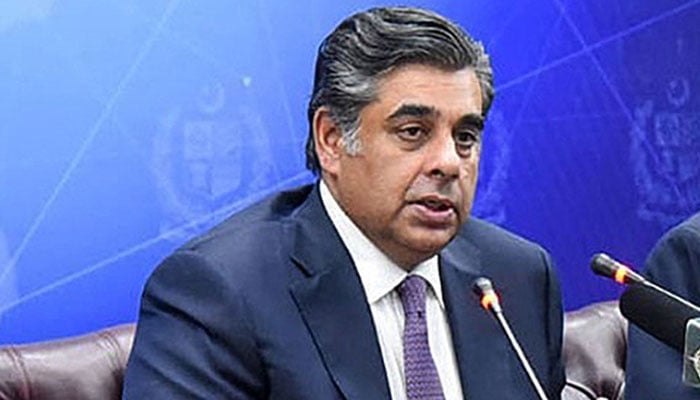Rs150bn a month paid to IPPs as capacity charges since Jan: ex-minister
Pakistan China Joint Chamber of Commerce and Industry (PCJCCI) called for the cancellation of all agreements with IPPs and a focus on cheaper, renewable sources, particularly solar power
KARACHI: Former energy minister Gohar Ejaz has once again sparked debate about capacity payments made to independent power producers (IPPs) in the country.
In a tweet on Saturday (July 20), Ejaz shared data from the National Electric Power Regulatory Authority (Nepra) covering January to March 2024. The data shows that IPPs received billions in capacity payments in the three months despite generating little or no electricity.
Over the last few weeks, there has been strong criticism against the government’s IPP contracts with trade bodies like the Federation of Pakistan Chambers of Commerce & Industry (FPCCI) and Korangi Association of Trade & Industry (KATI) arguing that this system unfairly burdens consumers. Critics have also called for reforms to ensure capacity payments are linked to actual power generation, promoting a more efficient use of resources. Trade bodies also argue that if timely action is not taken, high power prices could eventually lead to closures of industries.
In his tweet, Ejaz highlighted concerns about the distribution of the Rs150 billion monthly capacity payments. He pointed out that half the IPPs receiving payments are operating at less than 10 per cent capacity. Even more concerning, according to Ejaz, is that four specific power plants are receiving Rs10 billion each per month despite generating “zero power supply”. Ejaz considers these payments a misappropriation of public funds, referring to them as “halal income” being given away to a select few.
Per the data shared by Ejaz, Wapda Hydel had a plant factor ranging from 13-27 per cent; its capacity payments were at Rs6-7 billion each month. Star Hydro Power maintained a plant factor between 11-12 per cent and its capacity payments were Rs2.3 billion each in January and February and a little over Rs1 billion in March, while Laraib Energy Limited’s plant factor achieved a significant increase, rising from 8.0 per cent in January to almost 60 per cent in March. Capacity payments to the plant reached over Rs1.2 billion in March.
Several thermal power plants exhibited varying degrees of plant factor. Hub Power Company Limited recorded zero per cent utilization in all three months -- Kohinoor Energy Ltd recorded zero per cent in February and March.
Nuclear power plants had maximum production. Karachi Nuclear Power Plant Units 2 and 3 witnessed a steady increase in their plant factor, ranging from 60 per cent to 87 per cent and 76 per cent to 82 per cent respectively, between January and March. Similarly, PAEC Chashma Nuclear Power Plant Units 1, 2, 3, and 4 all had adequate power generation.
A couple of days back, Federal Minister for Energy Awais Leghari had a Twitter spat with Ejaz over capacity payments to IPPs. Leghari had said that efforts to aggressively address discrepancies in power distribution companies (DISCOs) had been initiated for the first time in the country, adding that discussions were underway to streamline cash flows with IPPs and stressed the critical need to maximize the effective use of current generation capacity.
On Thursday, the Pakistan China Joint Chamber of Commerce and Industry (PCJCCI) called for the cancellation of all agreements with IPPs and a focus on cheaper, renewable sources, particularly solar power.
-
 Mexico’s President Considers Legal Action Over Elon Musk Cartel Remark
Mexico’s President Considers Legal Action Over Elon Musk Cartel Remark -
 Prince William Hits The Roof With The Andrew Saga Bleeding Into Earthshot
Prince William Hits The Roof With The Andrew Saga Bleeding Into Earthshot -
 HBO Gives Major Update About 'Industry' Season Five And Show's End
HBO Gives Major Update About 'Industry' Season Five And Show's End -
 Donnie Wahlberg Responds To 'Boston Blue' Backlash: 'Nobody Was More Disappointed Than Me'
Donnie Wahlberg Responds To 'Boston Blue' Backlash: 'Nobody Was More Disappointed Than Me' -
 Jennifer Garner Gets Emotional Over Humble Career Start: 'It Makes Me Want To Cry'
Jennifer Garner Gets Emotional Over Humble Career Start: 'It Makes Me Want To Cry' -
 Princess Beatrice Told An Acquaintance That She ‘likes’ Jeffrey Epstein: Grim Verdict Drops
Princess Beatrice Told An Acquaintance That She ‘likes’ Jeffrey Epstein: Grim Verdict Drops -
 Late Katherine Short's Neighbours Give Insights Into Her 'peace Loving' Personality Post Suicide
Late Katherine Short's Neighbours Give Insights Into Her 'peace Loving' Personality Post Suicide -
 Fresh Details Of King Charles, Queen Camilla's US Visit Emerge Amid Andrew Investigation
Fresh Details Of King Charles, Queen Camilla's US Visit Emerge Amid Andrew Investigation -
 Iran 'set To Buy' Chinese Carrier-killer Missiles As US Forces Gather In Region
Iran 'set To Buy' Chinese Carrier-killer Missiles As US Forces Gather In Region -
 Prince Harry And Meghan Unlikely To Meet Royals In Jordan
Prince Harry And Meghan Unlikely To Meet Royals In Jordan -
 Hero Fiennes Tiffin Shares Life-changing Advice He Received From Henry Cavill
Hero Fiennes Tiffin Shares Life-changing Advice He Received From Henry Cavill -
 Savannah Guthrie's Fans Receive Disappointing News
Savannah Guthrie's Fans Receive Disappointing News -
 Prince William Steps Out For First Solo Outing After Andrew's Arrest
Prince William Steps Out For First Solo Outing After Andrew's Arrest -
 Jake Paul Chooses Silence As Van Damme Once Again Challenges Him To Fight
Jake Paul Chooses Silence As Van Damme Once Again Challenges Him To Fight -
 Google Disrupts Chinese-linked Hacking Groups Behind Global Cyber Attacks
Google Disrupts Chinese-linked Hacking Groups Behind Global Cyber Attacks -
 Four People Killed In Stabbing Rampage At Washington Home
Four People Killed In Stabbing Rampage At Washington Home




